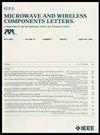5.85 mw 3.1 - 23.7 ghz两级CMOS VGA与2.53 db NF使用并发电流转向
IF 3.3
2区 工程技术
Q2 ENGINEERING, ELECTRICAL & ELECTRONIC
引用次数: 0
摘要
介绍了一种低功耗低噪声系数(NF)3.1–23.7-GHz CMOS可变增益放大器(VGA)。VGA由互补公共源(CCS)第一级和公共源(CS)第二级组成。由于具有多重电感阻抗匹配和增益补偿的电流复用CCS输入级,实现了低功率和NF以及宽带$S{11}$和$S{21}$。由于第一级和第二级同时进行栅极电压调谐(或电流控制),实现了大的增益调谐范围(具有低NF)。VGA消耗5.85 mW(在1V的$V_{\mathrm{ctrl}}$下),并实现了20.6 GHz(3.1–23.7 GHz)的出色的3dB带宽($f_{3\,\mathrm}dB}$)、11.9 dB的最大$S_{21}$、2.53 dB的最小NF(NFmin)、3.97 dB的平均NF(NFavg)、±16.5 ps的小组延迟(GD)变化和−6.5 dBm的输入三阶截距点(IIP3)。此外,对于0.6–1.6 V的$V_{\mathrm{ctrl}}$,VGA实现了23.4 dB(−5.4至18 dB)的良好增益调谐范围。芯片面积为0.364 mm2。本文章由计算机程序翻译,如有差异,请以英文原文为准。
5.85-mW 3.1–23.7-GHz Two-Stage CMOS VGA With 2.53-dB NF Using Concurrent Current Steering
A low-power and low noise-figure (NF) 3.1–23.7-GHz CMOS variable-gain amplifier (VGA) is presented. The VGA composes of a complimentary common-source (CCS) first stage, followed by a common-source (CS) second stage. Low power and NF and wideband $S_{11}$ and $S_{21}$ are achieved due to the current-reused CCS input stage with multiple inductive impedance matching and gain compensation. A large gain tuning range (with low NF) is achieved due to the concurrent gate–voltage tuning (or current steering) of the first and the second stages. The VGA consumes 5.85 mW (at $V_{\mathrm {ctrl}}$ of 1 V) and achieves excellent 3-dB bandwidth ( $f_{3\,\mathrm {dB}}$ ) of 20.6 GHz (3.1–23.7 GHz), maximum $S_{21}$ of 11.9 dB, minimum NF (NFmin) of 2.53 dB, average NF (NFavg) of 3.97 dB, small group delay (GD) variation of ±16.5 ps, and input third-order intercept point (IIP3) of −6.5 dBm. Moreover, the VGA achieves a decent gain tuning range of 23.4 dB (−5.4 to 18 dB) for $V_{\mathrm {ctrl}}$ of 0.6–1.6 V. The chip area is 0.364 mm2.
求助全文
通过发布文献求助,成功后即可免费获取论文全文。
去求助
来源期刊

IEEE Microwave and Wireless Components Letters
工程技术-工程:电子与电气
自引率
13.30%
发文量
376
审稿时长
3.0 months
期刊介绍:
The IEEE Microwave and Wireless Components Letters (MWCL) publishes four-page papers (3 pages of text + up to 1 page of references) that focus on microwave theory, techniques and applications as they relate to components, devices, circuits, biological effects, and systems involving the generation, modulation, demodulation, control, transmission, and detection of microwave signals. This includes scientific, technical, medical and industrial activities. Microwave theory and techniques relates to electromagnetic waves in the frequency range of a few MHz and a THz; other spectral regions and wave types are included within the scope of the MWCL whenever basic microwave theory and techniques can yield useful results. Generally, this occurs in the theory of wave propagation in structures with dimensions comparable to a wavelength, and in the related techniques for analysis and design.
 求助内容:
求助内容: 应助结果提醒方式:
应助结果提醒方式:


